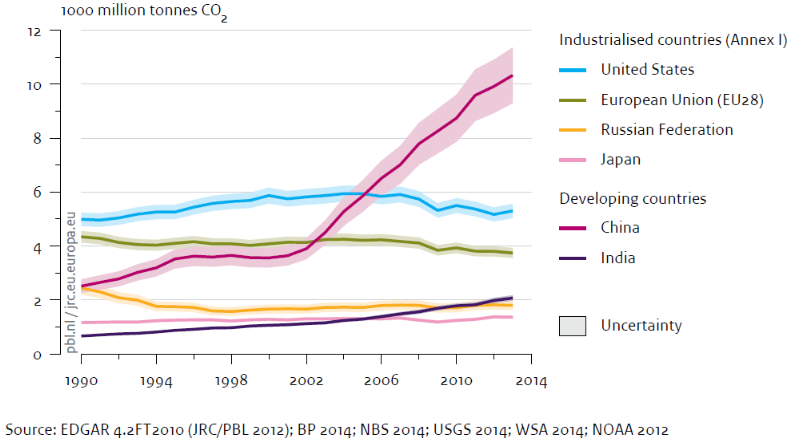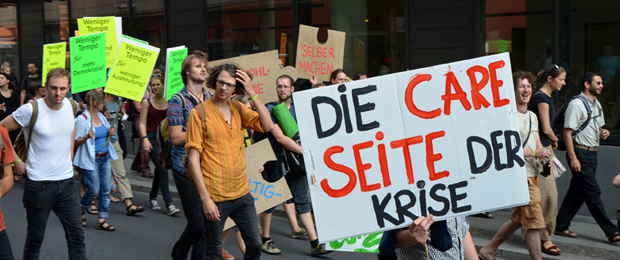Interview mit Christine Bauhardt
Prof. Dr. Christine Bauhardt ist Professin für Gender und Globalisierung an der Humboldt Universität in Berlin. Ihre Forschungsschwerpunkte sind Gesellschaftliche Naturverhältnisse und Geschlechterverhältnisse, Feministische Ökonomiekritik sowie Migration und Stadtentwicklung. Für die Interview-Reihe des Stream towards Degrowth hat sie unsere Fragen auf Englisch beantwortet. Das Interview erhielten wir im Rahmen unserer Kooperation mit der Veranstaltungsreihe "Wege in eine ökologische und gerechte Gesellschaft" der Friedrich-Ebert-Stiftung und der Urania. > Zum Urania-Programm.
Imagine we're living in the future, say in the year 2030, in a time of well-being. Humanity enjoys a good life beyond economic growth. Let's look back at the last few decades.
1. In what respect did society depend on growth?Economic growth at that time was fostered by the demand for conspicuous consumer goods, e.g. cars and clothes. The German car manufacturing was the leading sector for expensive and petrol consuming vehicles. They were bought by affluent male car drivers wanting to display wealth and power. The demand for clothes, either cheap or expensive, was driven by the fashion industry and ideas about female beauty and attractiveness.
2. What obstacles impeded a turning away from economic growth?Turning away from economic growth would have meant dealing with projections about social gender norms and gendered desires. Consumer goods do not only satisfy basic needs. They very often compensate for hidden psychic impulses. Therefore, appeals to less, but more deliberate consumption often remain vain.
3. How did your actions contribute to a society beyond growth?I have always been leading a hedonistic lifestyle. Everyday, I chose which mode of transportation met best my travel needs and provided me with most pleasure. In the sunshine I cycled to my workplace, in the rain I travelled by public transport using the time to read the newspaper. I have ever been passionate about good food and I love cooking so I have been shopping at my local farmer’s market as often as possible. Time affluence has always been of great value to me.
4. From your point of view, what does well-being imply in a society that consciously chose low production and consumption levels?
Well-being in this sense would imply for me satisfying and reliable social relations. In a society in which commodities are less available by financial means, economic and social security depends largely on the individual capacity to construct and maintain personal relationships. This is time-consuming and can comprise power relations. In the current debate, I think, these aspects are not enough reflected on.
5. Which signs for a world beyond growth did you already notice in 2013?In 2013, the financial crisis was the most obvious sign that economic growth serves the mighty and wealthy and disempowers the majority of people. A world beyond growth in 2013 looked more like a dystopia of inequality and injustice than a happy and socially rich degrowth society. Economic degrowth had to be coupled with political democracy in order to develop a new vision of prosperity.

We live nextdoor to my partner’s grandmother, Maria, who was born during the Second World War in Northern Italy. This means that she knows what hard times look like. Maria could not believe we would be using washable diapers for our baby boy. With genuine surprise she asked me, “why?”, and then she was curious in which pot we were planning to boil the diapers. In her eyes, we could not possibly...

... und was die Sommerschule "Degrowth konkret: Klimagerechtigkeit" dazu beiträgt Von Elena Hofferberth Der UN-Klimaprozess findet mit der 21. Conference of Parties in Paris in diesem Jahr einen weiteren Höhepunkt. Ziel ist die Verabschiedung eines verbindlichen, alle Staaten umfassenden Klimaabkommens, welches die Erwärmung der Atmosphäre auf maximal 2 Grad begrenzen soll. Ob es dazu kommt i...

Von Ulrich Schachtschneider Mit der Degrowth-Bewegung ist ein neuer Stern am Himmel der sozialen Bewegungen erschienen. Doch die traditionelle Linke beobachtet diese Neu-Erscheinung etwas kritisch – ist es doch ein Aufbruch, der auch ohne sie möglich erscheint. Es fehlten die marxistischen, feministischen und antirassistischen Analysen und die entsprechenden Parolen. Wo sie doch kamen, wurden ...